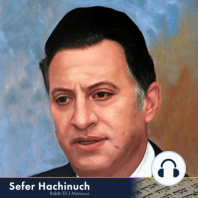20 min listen
Misva #133: The Prohibition Against Extinguishing Fire on the Altar
FromSefer Hachinuch
ratings:
Length:
20 minutes
Released:
Feb 4, 2022
Format:
Podcast episode
Description
The Torah in Parashat Sav (6:6) says about the fire on the altar, “Lo Tichbeh” – “it shall not be extinguished,” establishing a prohibition against extinguishing any part of the fire that burned on the altar. Even if someone took a fiery coal off the altar and then extinguished it somewhere else, he has violated this command. The prohibition forbids extinguishing not only fire which burns on the altar, but even fire which had been taken from the altar. The exceptions to this rule are coal taken for burning the Ketoret (the daily incense which was offered in the Bet Ha’mikdash), and coal taken for the purpose of lighting the Menorah. Once a piece of coal was taken for the Ketoret or for the Menorah, it is no longer considered fire from the altar, as its status has changed, and therefore, one does not violate a Biblical command by extinguishing that coal. This Halacha applies only in the times of the Bet Ha’mikdash, and is binding not only on the Kohanim, but on all people, both men and women. Anyone who extinguishes coal from the Mizbe’ah in the Bet Hamikdash transgresses this prohibition. The question arises in light of this prohibition as to how the Mizbe’ah was transported through the wilderness. Beneh Yisrael constructed the Mishkan – a portable Bet Ha’mikdash – at Mount Sinai, and they carried it and all its furnishings with them as they traveled through the desert. How did they carry the altar, if they were not permitted to extinguish the fire? The Tanna’im (cited in the Sifra to Vayikra 6:6) debate the question of what happened to the fire on the altar during travel. G-d commanded that before each time Beneh Yisrael journeyed, they were to prepare the altar – “Ve’dishnu Et Ha’mizbe’ah” (Bamidbar 4:13), but it is unclear what this means. Rabbi Shimon understood this verse as a command to sweep and clean the altar, removing all the coals. Rabbi Yehuda, however, disagreed, noting that removing the coals would violate the prohibition against extinguishing the fire on the Mizbe’ah. According to Rabbi Yehuda, the top of the altar was covered with a special utensil during travel, such that the fire continued to burn throughout Beneh Yisrael’s journeys. The command “Ve’dishnu Et Ha’mizbe’ah,” according to Rabbi Yehuda, required adding extra fuel to the fire to ensure that it continued burning throughout the journey. (Rabbi Yehuda understood “Ve’dishnu” as a reference to “Deshen” – “fat,” or fuel.) The question remains as to how, in Rabbi Shimon’s view, the coals were allowed to be removed from the altar before travel, given the prohibition against extinguishing fire on the altar. The Rash Mi’Shantz (France, late 12 th -early 13 th century) explained that according to Rabbi Shimon, the coals were not extinguished, but were rather removed from the altar and placed in a special utensil, where they continued burning. This way, the Kohanim who prepared the altar cleared its surface without violating the prohibition against extinguishing the altar’s fire. The Brisker Rav (Rav Yishak Zev Soloveitchik, 1886-1959) explained this theory by asserting that there are two separate laws relevant to the fire on the altar. First, the Kohanim are to ensure that a fire always burns on the altar. Secondly, they are forbidden from extinguishing the fire. According to Rabbi Shimon, the Torah required clearing the altar before travel, and so the first law, requiring the Kohanim to ensure to maintain the fire’s presence on the altar, did not apply during travel, having been suspended by G-d Himself. The second law, however, remained in force, and so the coals were placed in a special container without being extinguished. Rabbi Yehuda, by contrast, understood the command of “Ve’dishnu Et Ha’mizbe’ah” differently, as requiring covering the Mizbe’ah, such that both laws remained applicable when Beneh Yisrael traveled. They therefore covered the altar so the fire would continue burning as they journeyed.
Released:
Feb 4, 2022
Format:
Podcast episode
Titles in the series (100)
Misva #19: The Prohibition Against Eating Hametz on Pesach: Daily Sefer Hachinuch - Brought to you by itorah.com by Sefer Hachinuch
